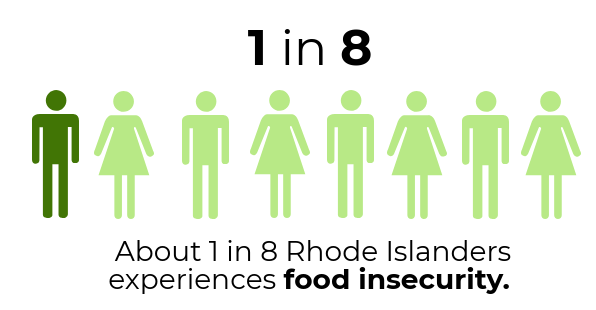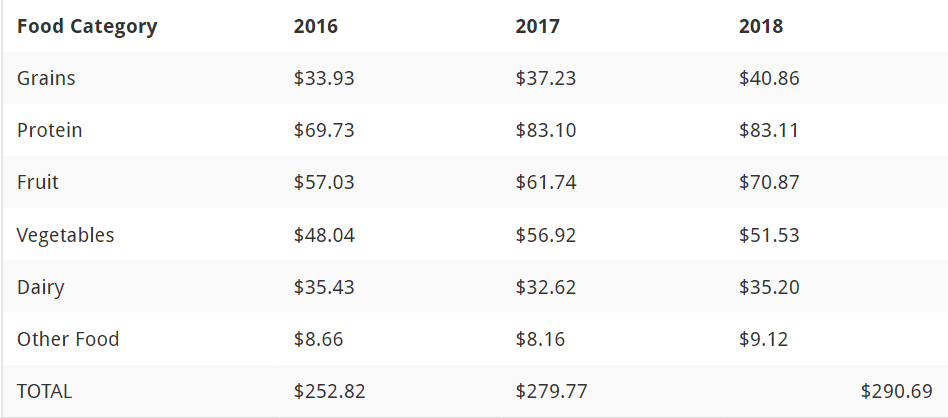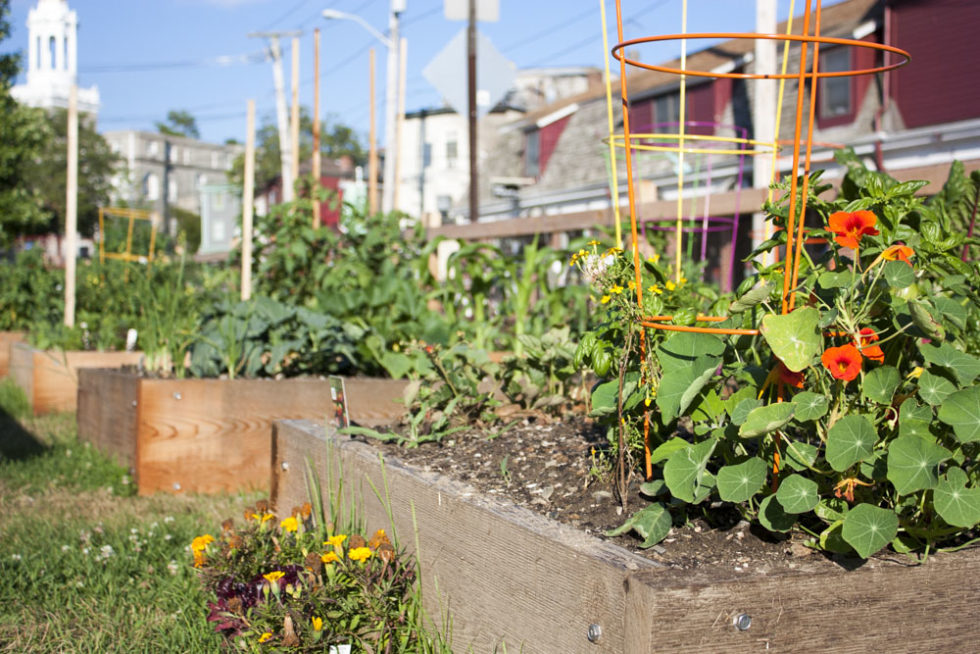
Photo credit: Aquidneck Community Table
With roughly 100,000 tons of food waste entering our landfill each year, it’s hard to imagine Rhode Island doesn’t have enough food to go around for everyone. Unfortunately, the reality is quite different and the disparity between food waste and hunger presents a much greater food security challenge for the Ocean State.
According to the United States Department of Agriculture (USDA), 12.4 percent of Rhode Islanders, over 54,200 households, are food insecure, meaning they are often unsure where their next meal will come from due to lack of resources. Moreover, 24,500 households experience severe conditions associated with hunger and report very low food security.
Food Insecurity Snapshot
In 2018, the Rhode Island Community Food Bank served 53,000 people each month of which 33 percent were children under the age of 18 and 20 percent were adults over the age of 60. According to the Rhode Island Food Policy Council, in 2017 Rhode Island had 167,512 Supplemental Nutrition Assistance Program (SNAP) participants and 22,040 participants in the Special Supplemental Nutrition Program for Women, Infants, and Children (WIC).
While food insecurity plagues communities across the state, it also hits home here on Aquidneck Island. In 2017, the City of Newport served 3,815 SNAP participants and 453 WIC participants with 1,430 students eligible for free or reduced meals. At the same time, Newport alone produced 1,200 tons of residential food waste, not including the thousands more coming from the City’s 249 restaurants.

Our Healthy Soils, Healthy Seas Rhode Island (HSHSRI) project partners serve as local food waste warriors, fighting to divert waste from the landfill and alleviate food insecurity in communities across Rhode Island. You may have seen Aquidneck Community Table (ACT) at the local farmer’s market, but our project partner is also a leader at the state-level, recently being recognized as one of Edible Rhody’s 2019 Local Hero Winners. ACT strives towards its mission to grow a healthy local food system, accessible to all on our island, and engages residents around important topics of food equity, diversity, and inclusion.
Across the pond, our project partner Rhodeside Revival (RSR) was born out of the idea of providing a service that brings the community together in an effort to prevent waste from entering our landfill, while also creating quality compost for all Rhode Islander’s. These efforts allow the team at RSR to make donations and positive changes to schools, gardens and other institutions within the communities they serve.
Food Waste Hurts Your Wallet
Throwing away food scraps and leftovers in the face of growing food insecurity is not just unfathomable, it’s also expensive. The Natural Resource Defense Council estimates that growing, processing, transporting, and disposing of uneaten food has an annual estimated cost of $218 billion, costing a household of four an average of $1,800 annually.
Even as the cost of food steadily climbs we continue to send unwanted leftovers to the landfill, where they take up precious space and produce harmful greenhouse gas emissions. The Rhode Island Community Food Bank conducted a study on food cost from 2016-2018 to measure changes in the cost of food for consumers. Over the three-year period the cost of food increased by 15 percent, with the average monthly shopping list rising from $252.82 in 2016 to $290.69 in 2018.

Farm to Fork
As Rhode Islanders, we’re lucky to enjoy the bounties of both land and sea. We’re surrounded by the waters of Narragansett Bay that support roughly 2,056 commercial fishers and 35 aquaculture farms. Rhode Island is also home to fertile farmland, 792 farms and 83 community gardens to be exact. Aquidneck Island boasts 56 of those farms and 7 of the community gardens that provide residents with fresh produce.

Photo credit: Aquidneck Community Table
Local farms are at the center of a sustainable food system and a strong economy that keeps food on the table and jobs in the state. Rhode Island’s food system supports nearly 70,000 jobs and 8,000 businesses, including 1,205 markets, 182 farm stands, and 73 farmers markets statewide. Many of these local farms are also leading the effort to feed those in need, making fresh produce more accessible in urban city centers, often referred to as food deserts for their lack of grocery stores, farmers’ markets, and healthy food providers.
Last year, the Rhode Island Community Food Bank distributed more than 2.2 million pounds of fresh produce to people in need of food assistance in Rhode Island. Local farm businesses and the Food Bank’s network of community farms produced 278,000 pounds of that total. Our third project partner, The Compost Plant (TCP), is another game-changer in the local food economy, helping farmers grow healthy food for all Rhode Islanders.
TCP seeks to close the loop in the food system, turning food scraps and “waste” products into compost and soil mixes that help gardeners and farmers grow more local food. Our project partner believes more local food means healthier communities, and it all starts with healthy soils.
Reducing food waste and ending hunger are tall orders, but we have the power to make change everyday with the decisions we make at home. Rhode Island Resource Recovery Corporation offers helpful tips and advice on how to plan better, shop smarter, and waste less. For more information on statewide initiatives to address food insecurity and to get involved visit:
- Relish Rhody
- Rhode Island Food Policy Council
- Mr. Luther King Junior Community Center
- Rhode Island Community Food Bank
- Hope’s Harvest
- Meals on Wheels RI
- Farm Fresh Rhode Island
And if you’re still looking for ways to reduce your waste footprint and repurpose those unwanted food scraps, then sign up for our composting pilot program, Healthy Soils, Healthy Seas Rhode Island. Together we can ensure food security in Rhode Island, while building rich soils that feed healthy people and grow sustainable communities.

